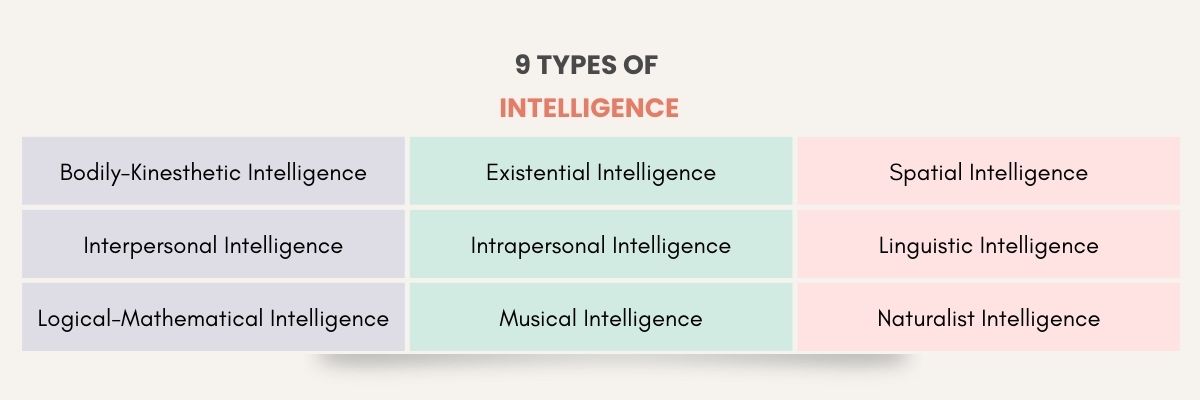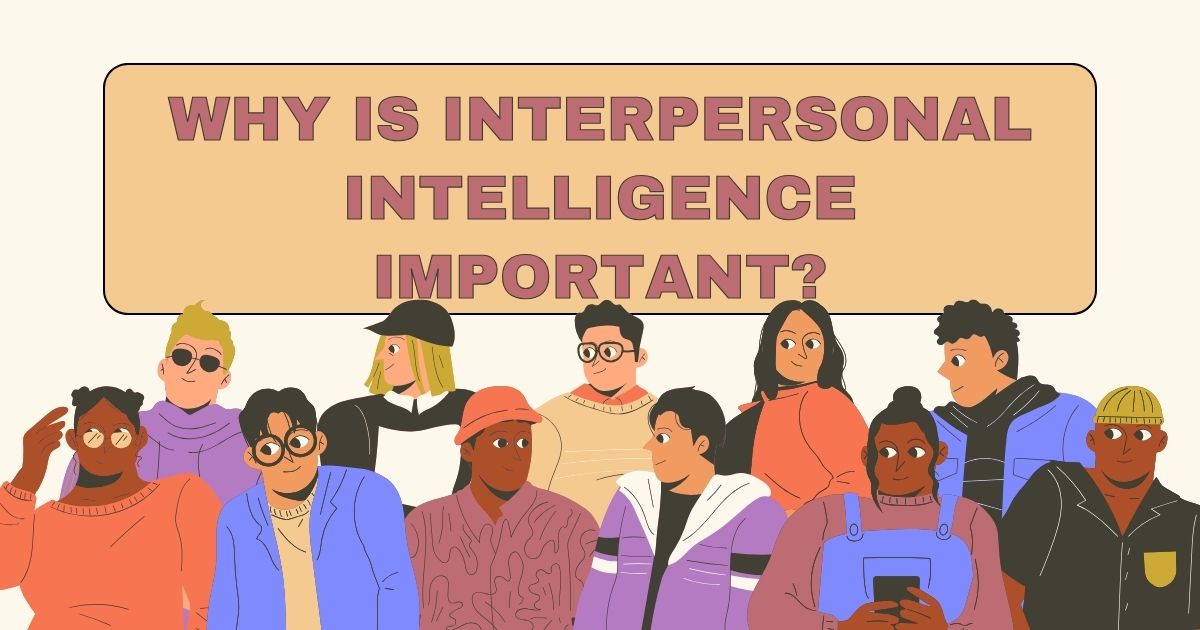Interpersonal Intelligence: Importances & How to Develop
There is no denying that the ability to understand, communicate, and interact effectively with others is more valuable than ever. This skill is known as interpersonal intelligence - the factors that create a chain of skills that silently build your personal and professional success.
But what exactly is interpersonal intelligence, and why is it so important? Is it an innate trait, or can it be developed over time? In this article, we’ll explore the significance of interpersonal intelligence, practical ways to enhance it, and whether it is a rare skill.
What is Interpersonal Intelligence?
Interpersonal Intelligence is the ability to understand and interact effectively with others. It involves strong communication skills, empathy, social awareness, and the ability to build or maintain relationships. People with high interpersonal intelligence excel in teamwork, conflict resolution, leadership, and persuasion.
This type of intelligence, one of Howard Gardner’s multiple intelligences, is essential for professions that require social interaction, such as teaching, sales, counseling, and management. Developing interpersonal intelligence can enhance personal and professional relationships by improving the ability to read social cues, understand different perspectives, and respond appropriately in various social situations.

Why is Interpersonal Intelligence important?
Success is not just about technical skills; it’s also about how well you connect with others. Strong interpersonal intelligence enhances teamwork, leadership, and even personal relationships.
Strengthens Relationships
One of the prominent ways interpersonal intelligence strengthens relationships is through empathy. Those with strong interpersonal intelligence can step into another person’s shoes, understanding their emotions and perspectives without judgment. When individuals feel heard, valued, and understood, they are more likely to reciprocate those feelings, creating a foundation of trust and emotional security.
People with interpersonal intelligence can manage their own emotions in a way that prevents unnecessary conflict and fosters constructive dialogue. They are skilled at recognizing tension, de-escalating arguments, and facilitating open discussions.
Enhances Communication Skills
Interpersonal intelligence significantly enhances communication skills by improving one’s ability to understand, interpret, and respond effectively in social interactions. People with strong interpersonal intelligence are highly attuned to verbal and nonverbal cues.

Improves Teamwork and Leadership
Effective teamwork relies on communication, trust, and cooperation — all of which are strengthened by interpersonal intelligence. Individuals with high interpersonal intelligence excel at recognizing group dynamics and adapting their behavior to enhance team cohesion. They understand the strengths, weaknesses, and motivations of their teammates. Based on that, they can delegate tasks effectively and create an inclusive atmosphere where everyone's input is valued.
Increases Emotional Intelligence (EQ)
Developing interpersonal intelligence leads to greater emotional resilience and adaptability. Those who master both intelligences (Interpersonal intelligence, Emotional Intelligence) can navigate social complexities with confidence, respond effectively to challenges, and foster deeper connections with others. As a result, they experience improved relationships, enhanced social interactions, and greater overall emotional well-being.
Helps in Conflict Resolution
Conflicts are inevitable in any social setting, but those with strong interpersonal intelligence can navigate disagreements calmly and effectively.
Instead of allowing disagreements to create division, individuals with high interpersonal intelligence use their emotional awareness and communication skills to turn conflicts into productive conversations. As a result, they foster stronger relationships, build trust, and contribute to healthier social and professional environments.
Boosts Career Success
Career success isn’t just about technical skills or expertise; it’s also about how well one interacts with others. Those with strong interpersonal intelligence can inspire teams, manage workplace challenges gracefully, and foster an inclusive work culture.
Enhances Personal Growth and Happiness
When individuals develop a strong understanding of others’ emotions, perspectives, and motivations, they build trust, strengthen their social bonds. Those with high interpersonal intelligence tend to experience greater life satisfaction because they create and maintain strong, healthy relationships.
How to develop interpersonal intelligence?

Some people naturally excel at reading social cues and understanding emotions, but interpersonal intelligence can be cultivated.
Practice Active Listening
Active listening goes beyond simply hearing words. Active listening is fully engaging with the speaker, focusing on their message, and responding thoughtfully. They can pick up on verbal and nonverbal cues, such as tone, facial expressions, and body language, leading to deeper connections, stronger relationships.
Active listening fosters emotional intelligence by encouraging individuals to be more patient, open-minded, and considerate of different perspectives. Instead of rushing to respond or formulating a reply while someone is speaking, active listeners take time to process what is being said.
Develop Empathy
To build empathy, put yourself in someone else’s shoes, acknowledge their emotions, and show genuine concern.
So, individuals will be able to strengthen their ability to connect with others on a deeper level, improving their relationships and fostering a sense of trust.
Strong empathy intensifies teamwork, leadership, and social harmony in both personal and professional settings. It allows people to navigate conflicts with greater sensitivity, offer support during difficult times, and create a more inclusive environment.
Improve Communication Skills
One way to enhance communication is by practicing clarity and conciseness in conversations. Being direct yet considerate in speech so that messages are understood without confusion. Additionally, don't forget to develop active listening skills and nonverbal communication.
Learn Conflict Resolution Skills
Conflict is a natural part of human interactions, but how one handles it determines the outcome — whether it leads to growth and understanding or resentment and division.
Solving conflict never be easy. You must acknowledge emotions, ask open-ended questions, and seek common ground rather than focusing on winning an argument. Using "I" statements (don't use blaming language) to de-escalate tensions and foster mutual respect. Additionally, being open to compromise and collaboration encourages solutions that satisfy both parties, rather than deepening divisions.
Strengthen Emotional Intelligence (EQ)
Interpersonal intelligence is closely linked to emotional intelligence. Emotional intelligence encompasses self-awareness, self-regulation, motivation, empathy, and social skills — all of which are essential for building strong relationships and meaningful connections with others.
Build Social Awareness
Building social awareness enables individuals to understand social dynamics, recognize emotional cues, and respond appropriately in various situations. To build it, you should be mindful of others' feelings, needs, and perspectives, which fosters stronger relationships and more meaningful interactions.
Paying attention to body language, facial expressions, and tone of voice can provide valuable insights into how others are feeling, even when they do not explicitly express their emotions. In conversations, you need to focus on what others are saying — rather than thinking about what to say next.
Another key component of social awareness is cultural sensitivity and inclusivity. Understanding and respecting different backgrounds, beliefs, and perspectives help individuals engage with others in a more empathetic manner.
Engage in Team Activities
Engaging in team activities encourages collaboration, communication, and the ability to work well with others. Individuals will learn how to navigate different personalities, resolve conflicts, and contribute to collective goals. These experiences enhance their ability to understand social dynamics and adapt their communication styles accordingly - a crucial aspect of interpersonal intelligence.
Read and Learn About Human Behavior
Reading and learning about human behavior is a powerful way to develop interpersonal intelligence. This knowledge supports us to navigate conversations, relationships, and group dynamics more effectively, improving our ability to connect with others on a deeper level.
Additionally, learning about human behavior supports individuals in recognizing their own biases, emotional responses, and communication styles. Understanding why people react in certain ways can lead to increased empathy.
Moreover, applying this knowledge in daily interactions strengthens interpersonal intelligence. Observing behaviors in real-life settings, reflecting on past interactions, and actively practicing learned concepts enhance one's ability to respond thoughtfully in various social contexts.
Is interpersonal intelligence rare?
Interpersonal intelligence is not necessarily rare, but it varies in strength among individuals. Some people naturally excel in social interactions, while others may struggle with communication and empathy. However, it is a skill that can be developed with effort and practice.
Nowadays, face-to-face interactions are decreasing. Strong interpersonal intelligence might seem less common. Many people rely on text-based communication, which can limit their ability to read emotions and social cues. Additionally, personality differences play a role. For example, introverts may find social interactions more challenging than extroverts.
While not everyone possesses it at a high level, those who actively work on their social and emotional skills can significantly improve their ability to connect with others.
Who are famous persons with interpersonal intelligence?
Several famous individuals have demonstrated high levels of interpersonal intelligence, excelling in communication, empathy, and relationship-building. Here are a few notable examples:
Oprah Winfrey

Throughout her career, Oprah has demonstrated remarkable empathy, active listening, and emotional intelligence. She can easily build trust with her audience and guests. Her talk show, The Oprah Winfrey Show, was a testament to her interpersonal skills. She engaged with people from all walks of life, making them feel heard and valued.
Beyond media, Oprah's interpersonal intelligence has contributed to her success as a philanthropist, business leader, and mentor. She has used her influence to empower others, foster meaningful discussions, and inspire social change.
Mahatma Gandhi

Mahatma Gandhi is a remarkable example of someone with high interpersonal intelligence.
Gandhi's deep empathy to understand the struggles of people from all walks of life. He actively listened to their concerns and worked tirelessly to unite diverse communities under a common cause. His speeches, writings, and peaceful protests demonstrated his ability to communicate effectively, even in the face of oppression.
Skilltrans brings you a list of courses to explore interpersonal intelligence more:
Principles of Effective Communication
Effective Communication is a topic that is fundamental to success in a business, career and every work of life.
This course explores these principles, highlighting the key aspects to take a note of.
This course also highlight areas that you might require development, focus on or concentrate on to deliver the most effective communication.
Some of the topics that we explore include:
- Clarity of message
- Understanding Your Audience
- Curating the message appropriately
- Vision: Building a path for listeners in communication
- Checking understanding, test reception, ask and get feedback
- Communication in the age of Social media, multiple sources and many other topics
(Oxford Diploma ) : The Leadership Program
Do you want to get ahead...and stay ahead? Then you need to know about leadership trends and be able to remember them, expand on them, apply them by remembering a key word, a key phrase or...a cartoon?
This short course deals with leadership trends for this year, summarises them and then a cartoon especially drawn for this course by award-winning Pepe (co-instructor) is shown. Freeze the frame. Print it out and stick it on the fridge so every morning you see these key leadership trends.
Soft skills for life & work: develop yourself for success
This course aims to give you an insight into the essential soft skills and how you can use these, as well as to look at your own soft skills and identify the areas where you want to improve. The course will also give you a wealth of soft skills tools, tips and strategies to use for personal development and success in your life and at work.
As you go through the course you will be able to apply the learnings and develop your own personalised soft skills plan.
The course is designed to be practical and relevant to real life. It includes lots of ideas, tips and strategies, straightforward explanations and lots of information for you to use as to how to develop and improve your soft skills. It is not a theoretical or academic course on soft skills.
Conclusion
Interpersonal intelligence assists individuals to connect with others, navigate social situations, and build meaningful relationships. Interpersonal intelligence is more than just social skills - it is the foundation of human connection.
To learn more about interpersonal intelligence, you can sign up for Skilltrans courses. We look forward to taking you to the land of learning.

Meet Hoang Duyen, an experienced SEO Specialist with a proven track record in driving organic growth and boosting online visibility. She has honed her skills in keyword research, on-page optimization, and technical SEO. Her expertise lies in crafting data-driven strategies that not only improve search engine rankings but also deliver tangible results for businesses.



